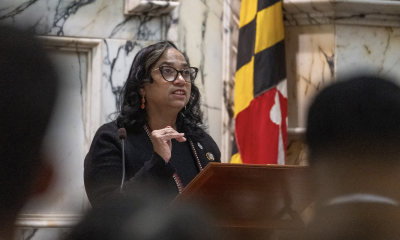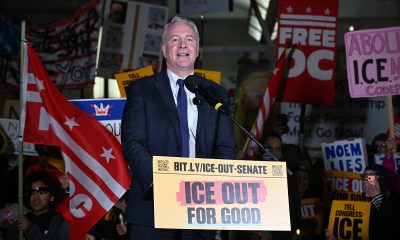Local
Maryland House passes trans bill
Protection act has supporters in the Senate; measure passed by wide margin
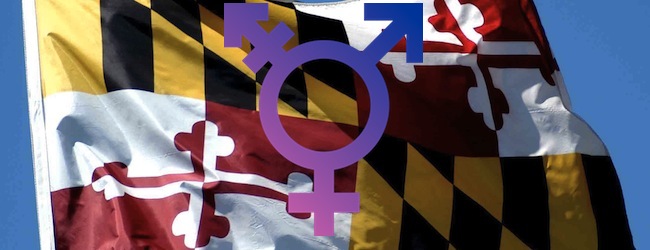
The Maryland House of Delegates voted 86-52 on Saturday to pass legislation that would ban discrimination against transgender Marylanders in the area of employment, housing and credit.
The vote came after a 50-minute debate in which delegates supporting the Gender Identity Anti-Discrimination Act urged their colleagues to help end what they called an injustice against fellow citizens whom they said have been denied jobs and housing solely because of their gender identity.
“This is a huge demonstration in support of fairness today,” said Morgan Meneses-Sheets, executive director of Equality Maryland, the state LGBT group that led lobbying efforts to pass the bill.
“We still have work to do,” she said. “We’ve got to get it through the Senate. But we are overjoyed with the outcome today.”
Meneses-Sheets and other advocates for the bill said they were hopeful the measure would clear the Senate Judicial Proceedings Committee in the next week and receive a favorable vote in the full Senate.
The Maryland Legislature adjourns for the year on April 11, and all legislation must clear both houses before then.
Saturday’s vote in favor of the gender identity bill in the 141-member House fell largely along party lines. Eighty-five Democrats and just one Republican voted for the bill. Forty Republicans and 12 Democrats voted against it. Three delegates — two Republicans and one Democrat — were absent and did not vote.
The House’s approval of the gender identity bill by a sold 34-vote margin appears to indicate that transgender rights, while controversial, hasn’t elicited the intensity of opposition that surfaced over a Maryland same-sex marriage bill.
A bill calling for legalizing civil marriage for same-sex couples died in the House of Delegates two weeks ago when Democratic leaders withdrew the bill from the floor after determining they did not have the votes to pass it. The Maryland Senate passed the bill by a vote of 25-21 on Feb. 25.
Some activists feared that the heated controversy over the decision to withdraw the marriage bill before a vote might make delegates less likely to support any LGBT-related bill, including a transgender rights bill.
A number of House Democrats who wavered over or announced plans to drop their support of the marriage bill voted for the gender identity bill on Saturday. Among them were Dels. Sam Arora (D-Montgomery County), Tiffany Alston (D-Prince George’s County) and Jill Carter (D-Baltimore City).
During Saturday’s floor debate over the gender identity bill, opponents, including Del. Joseph Minnick (D-Baltimore County) and Del. Richard Impallaria (R-Baltimore and Harford Counties) raised concerns that the bill would enable men who “cross dress” as women to create disturbances in the workplace or threaten women in public or workplace bathrooms.
“Every woman should be appalled by this legislation,” said Minnick, who told of once encountering a male-to-female transgender person in a public men’s bathroom at the state capital in the 1990s.
“That left a lasting impression on me,” he said. “The way that person was dressed [he] could have very easily gone into the lady’s room and used the lady’s facility. Now I don’t think that’s what you want with this kind of legislation.”
A few of the delegates opposing the bill pointed to the 1970s television program M.A.S.H., which included a character named Maxwell Klinger. They noted the Klinger character dressed in female clothes at a U.S. Army installation in Korea during the Korean War as a ploy to obtain a “Section 8” psychiatric discharge from the military.
Minnick said the gender identity bill could hurt businesses by allowing cross dressing “scammers” like the Klinger character to create problems at the workplace and file a lawsuit if the employer sought to fire the person.
Del. Dan Morhaim (D-Baltimore County), who served as floor leader for the bill, disputed claims that it would impact public bathrooms, saying the legislation did not include a public accommodations provision and would make no changes in the availability of public bathrooms to transgender people.
When asked by opponents whether transgender employees protected under the bill’s employment non-discrimination provision would have access to workplace bathrooms, Morhaim said that would be left to the discretion of an employer.
Del. Kirill Reznick (D-Montgomery County), a supporter of the bill, said that while public bathrooms were not covered in the Gender Identity Non-Discrimination Act, transgender non-discrimination laws that do include public accommodations protections have not created problems — either related to bathrooms or at the workplace.
“The reality is 12 states have passed broader protections that this bill,” he said. “A hundred and thirty-four jurisdictions — counties and cities across this country — have boarder protections than this bill. And we have not heard of one instance where businesses have had to build a third bathroom, where children or women have been attacked and these protections were used as a defense — not one case in 10 years,” he said.
Del. Joseline Pena-Melnyk (D-Prince George’s and Anne Arundel Counties), the author and lead sponsor of the bill, expressed dismay over what she called “unfounded” assertions that transgender people cause problems at the workplace or in bathrooms.
“In the last few minutes I have heard some things that are truly sad,” she said. “The reason why we need this bill is because of what you heard today. People have preconceived ideas and prejudices.”
Pena-Melnyk said she was troubled that opponents were basing much of their opposition on perceived problems that could not result from the bill, in part, because she removed a public accommodations provision to expand the support needed to pass the bill.
“And I did so because the political reality is that I could not have gotten the bill out — look at the discussion today — if I had public accommodations in it,” she said. “But it gives you protections.”
Del. Maggie McIntosh (D-Baltimore City), one of seven openly lesbian or gay members of the House of Delegates, noted that transgender protections were omitted entirely from a Maryland law banning discrimination based on sexual orientation that the legislature passed 10 years ago.
“It was a calculated decision and one that I frankly regret,” she said, referring to the omission of a transgender provision. “I think it was the wrong decision. And this bill today, House Bill 235, rights a very bad wrong that we need to do,” she said. “And I ask you to support House Bill 235, a very important step forward to end discrimination in Maryland.”
Transgender rights advocate Dana Beyer, who ran for a seat in the House of Delegates last year, called approval of the bill by the House historic.
“We still have two more votes to go to get this bill done and then we need to work on adding public accommodations next year,” she said. “Actually, the only statement from the opponents with which I agree was, you know, if you give them this now they will come back and say they want full civil rights. And, yeah, that’s the case. We want full civil rights, and we’ll get them one step at a time.”
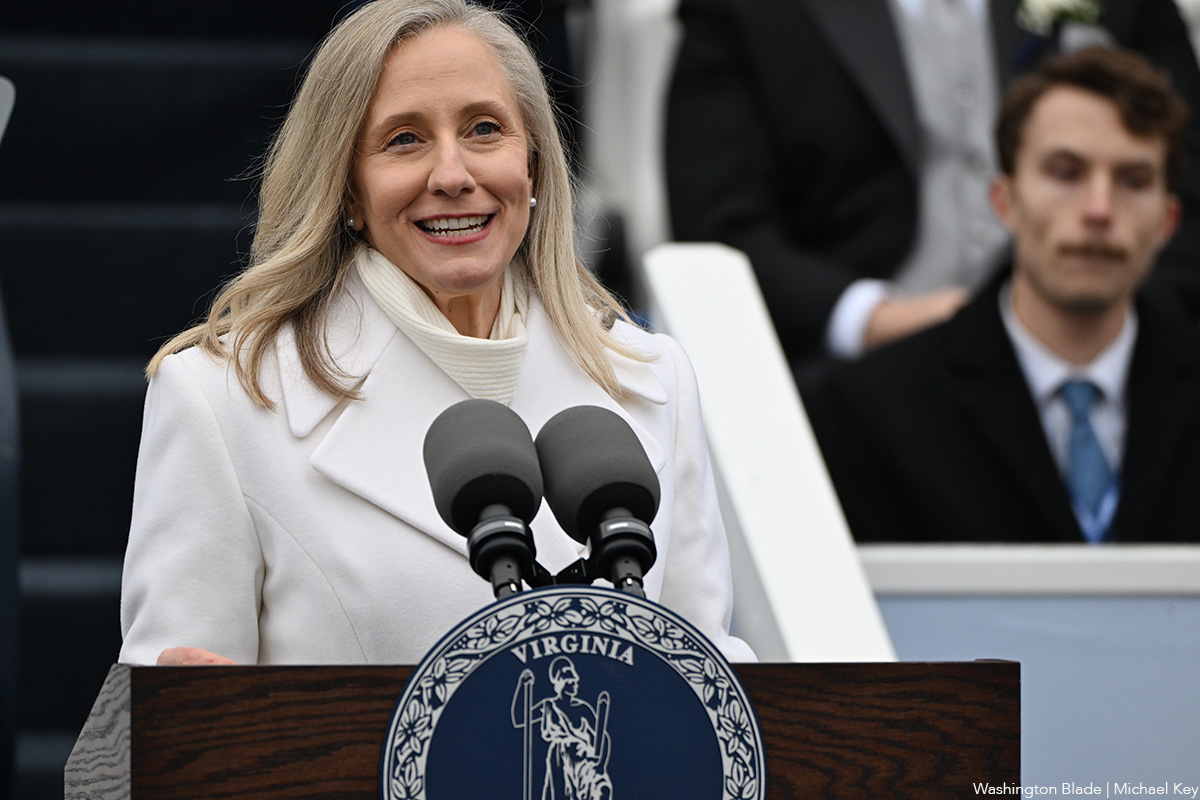
Abigail Spanberger was sworn in as the 75th governor of Virginia at a ceremony on the grounds of the Virginia State Capitol on Saturday. Thousands of spectators watched the swearing-in ceremony and parade, despite the rain and temperatures in the low 40s.
Spanberger, a member of the Democratic Party and an LGBTQ ally, became the first woman to be Virginia’s governor.
View on Threads
Newly-elected Attorney General Jay Jones, Lt. Gov. Ghazala Hashmi, and Spanberger were each administered the oath of office in the public ceremony.
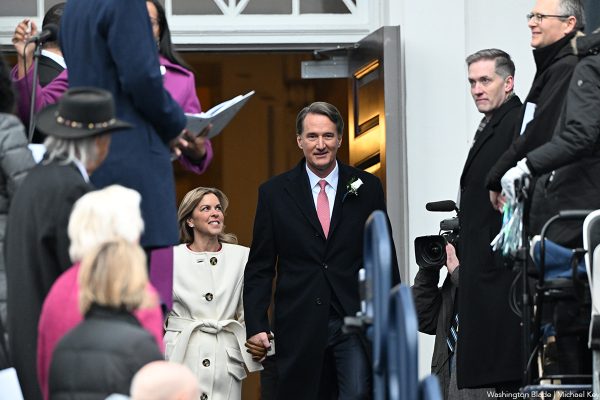
Republican former Gov. Glenn Youngkin left the ceremony shortly after the oath of office was administered to Spanberger and before the inaugural address.
In her speech, the new governor made an appeal to bipartisanship and looking past division in our current moment.
“To my friends in the General Assembly — on both sides of the aisle — I look forward to working with you,” said Spanberger. “I know what it means to represent your constituents, to work hard for your district, and to pursue policies you believe in. We will not agree on everything, but I speak from personal experience when I say that we do not have to see eye-to-eye on every issue in order to stand shoulder-to-shoulder on others.”
Spanberger acknowledged Virginians’ frustrations with federal layoffs and governmental policy.
“I know many of you are worried about the recklessness coming out of Washington. You are worried about policies that are hurting our communities — cutting healthcare access, imperiling rural hospitals, and driving up costs,” said Spanberger. “You are worried about Washington policies that are closing off markets, hurting innovation and private industry, and attacking those who have devoted their lives to public service.”
Spanberger alluded to the Trump-Vance administration, though never mentioned President Donald Trump’s name in her remarks.
Spanberger said, “you are worried about an administration that is gilding buildings while schools crumble, breaking the social safety net, and sowing fear across our communities, betraying the values of who we are as Americans, the very values we celebrate here on these steps.”
The new governor then spoke of her priorities in office, pledging to tackle housing affordability by working to “cut red tape” and increase housing supply. Spanberger also spoke of forestalling an impending healthcare crisis by protecting access and cracking down on “middlemen who are driving up drug prices.”
Spanberger spoke of investments in education at every level, standing up for workers (including the large number of federal workers in Virginia), and taking action on gun violence.
Virginia married couple Mary Townley and Carol Schall witnessed the inauguration ceremony from the stands set up on the grounds of the Capitol. Schall and Townley are one of the plaintiff couples in the case that challenged the Virginia constitutional ban on same-sex marriage.
Same-sex marriage became legal in Virginia in 2014.
“We are delighted with the inauguration of Abigail Spanberger as governor of Virginia,” Schall told the Washington Blade. “The celebration of her inauguration was full of the beautiful diversity that is Virginia. The Virginia Pride contingent was included as a part of what makes Virginia a great place to live.”
“Such an honor to attend such a wonderful event in Virginia history,” Townley told the Blade. “The weather before the Inauguration was cold and rainy, but I believe it represented the end of a dreary time and it ushered in the dry and sunny weather by the end of the inaugural parade. Madam Governor brought us to the light!”
The inaugural parade following the governor’s remarks included a contingent from Diversity Richmond and Virginia Pride. Marchers in the LGBTQ contingent carried a giant Progress Pride flag and were met with loud cheers from the gathered spectators.

Spanberger after her inauguration signed 10 executive orders. One of them bans discrimination against state employees based on sexual orientation, gender identity, and other factors.
“By virtue of the authority vested in me as Governor under Article V of the Constitution of
Virginia, I hereby declare that it is the firm and unwavering policy of the Commonwealth of Virginia to ensure equal opportunity in all facets of state government,” reads the executive order. “The foundational tenet of this executive order is premised upon a steadfast commitment to foster a culture of inclusion, diversity, and mutual respect for all Virginians.”
Virginia
VIDEO: LGBTQ groups march in Va. inaugural parade
Abigail Spanberger took office on Saturday
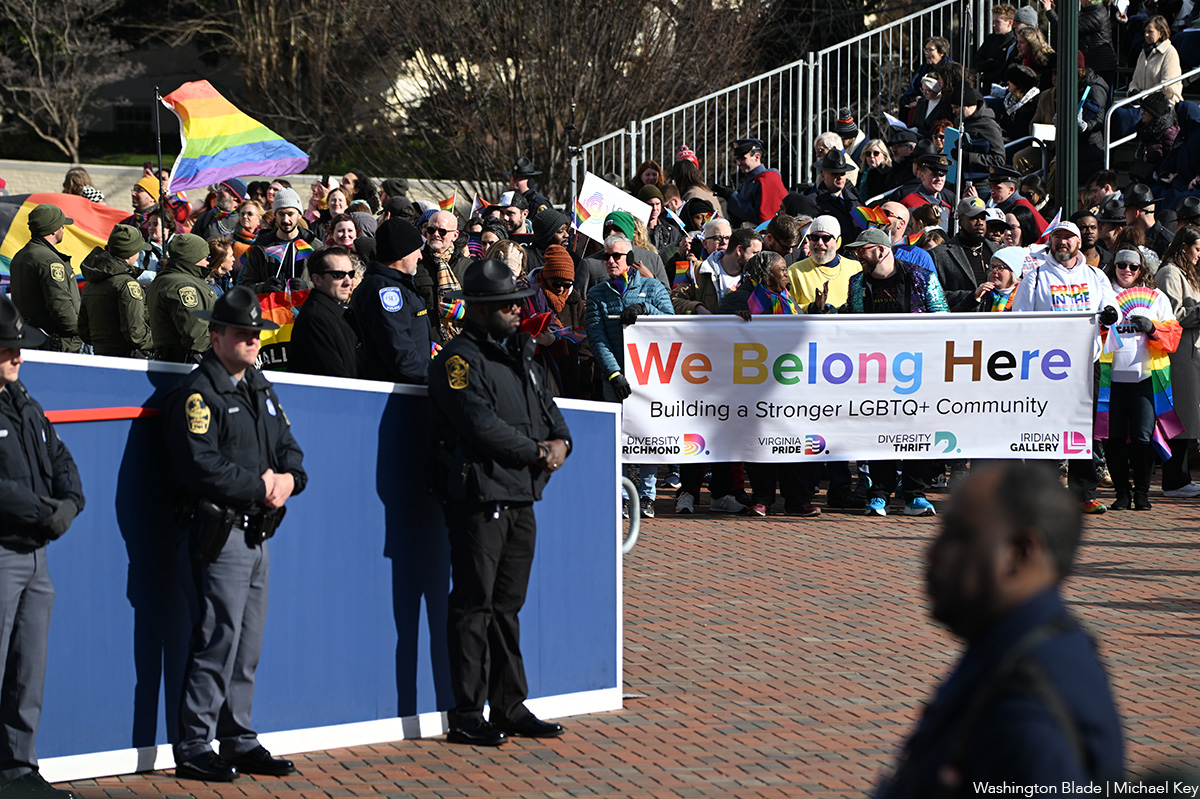
The inaugural ceremonies for Virginia Gov. Abigail Spanberger were held in Richmond, Va. on Saturday. Among the groups marching in the parade were Diversity Richmond and the Virginia Pride project of Diversity Richmond.
View on Threads
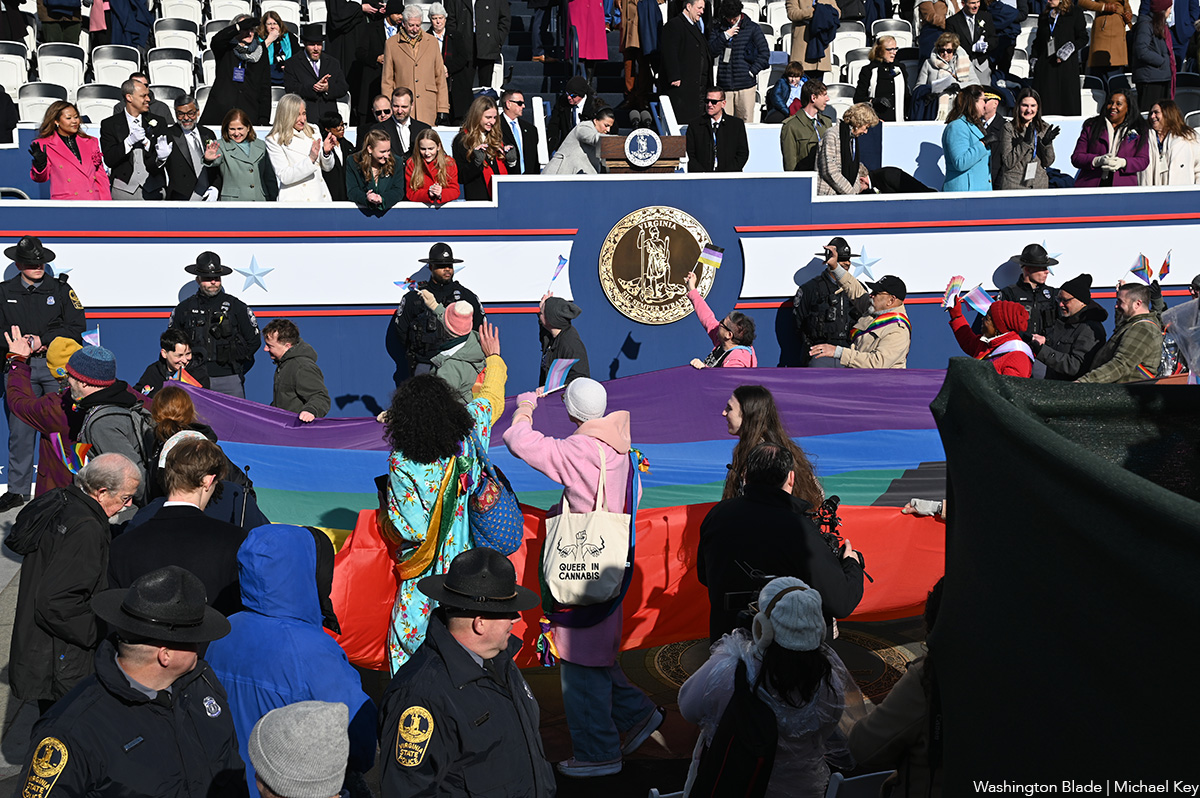
Virginia
Va. Senate approves referendum to repeal marriage amendment
Outgoing state Sen. Adam Ebbin introduced SJ3

The Virginia Senate on Friday by a 26-13 vote margin approved a resolution that seeks to repeal a state constitutional amendment that defines marriage as between a man and a woman.
Outgoing state Sen. Adam Ebbin (D-Alexandria) introduced SJ3. The Senate Privileges and Elections Committee on Wednesday approved it by a 10-4 vote margin.
Same-sex couples have been able to legally marry in Virginia since 2014. Outgoing Republican Gov. Glenn Youngkin in 2024 signed a bill that codified marriage equality in state law.
A resolution that seeks to repeal the Marshall-Newman Amendment passed in the General Assembly in 2021. The resolution passed again in 2025.
Two successive legislatures must approve the resolution before it can go to the ballot. Democrats in the Virginia House of Delegates have said the resolution’s passage is among their 2026 legislative priorities.
“It’s time for Virginia’s Constitution to reflect the law of the land and the values of today,” said Ebbin after Friday’s vote. “This amendment, if approved by voters, would affirm the dignity of all committed couples and protects marriage equality for future generations.”
-

 Iran4 days ago
Iran4 days agoGrenell: ‘Real hope’ for gay rights in Iran as result of nationwide protests
-

 Congress5 days ago
Congress5 days agoVan Hollen speaks at ‘ICE Out for Good’ protest in D.C.
-

 LGBTQ Non-Profit Organizations5 days ago
LGBTQ Non-Profit Organizations5 days agoNational LGBTQ Task Force brings Creating Change conference back to D.C.
-

 Virginia4 days ago
Virginia4 days agoMark Levine loses race to succeed Adam Ebbin in ‘firehouse’ Democratic primary

